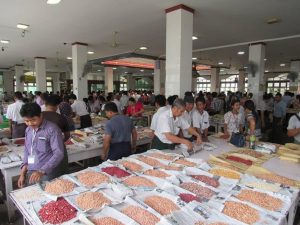By Kyaw Htike Soe
There is an increase in the export volume and value of Myanmar’s beans and pulses in the current fiscal year regardless of the ongoing Covid-19 pandemic, according to the Ministry of Commerce. Myanmar exported 1.15 million tonnes of various beans and pulses to foreign markets through over 200 domestic trading companies in the present financial year, an increase of over 100,000 tonnes and around US$ 130 million when compared to the same period last year, said U Min Min, Director-General of Department of Trade under the ministry.
Myanmar transported over 1.15 million tonnes of beans and pulses to foreign markets from 1 October 2019 to late June in the current financial year 2019-2020, fetching over US$ 730 million, according to the figure released by the ministry. About US$ 600 million worth beans and pulses were exported during a-year ago period. Mung beans is the main export item among beans and pulses, with an estimated earning of some US$ 326 million, followed by green grams, with an export value of US$ 198 million and pigeon peas with US$ 96 million. Myanmar is a major pulse exporting nation among ASEAN countries in growing various kinds of beans and pulses. Myanmar is the biggest exporter of beans and pulses in Asia and ranks second after Canada in the world.
Mung bean plantation season in the middle of Myanmar is from late May to mid-June and October to November, and November to December. Black gram, green mung beans, butter beans, cow peas, soybeans, chickpeas, and pigeon peas are usually grown by farmers in Myanmar on commercial scale. The crops are becoming increasingly popular with farmers, as they fetch higher prices than paddy while production costs are lower. Rainy season pulses are generally cultivated in June-July and harvested in September-October. Winter season pulses are grown in November-December and harvested in January-February, according to the ministry. Myanmar’s beans and pulses are mainly exported to neighbouring India, followed by China, Indonesia, European countries and Japan. About 80 per cent of beans and pulse export go to India.
Besides India, Myanmar beans are shipped to over 50 countries around the world including Bangladesh, Pakistan, Sri Lanka, Nepal, UAE, Malaysia, Indonesia, Japan, some ASEAN, and European countries. Since Myanmar secured an access to the European market in 2013, an increasing amount of pulses are making their way to Europe. But Myanmar’s beans and pulses export to India has decreased in recent years as the South Asian country pursues pulse self-sufficiency and encourages its domestic production. The mung bean price goes up for a reasonable percentage in the market. The ministry has been conducting discussions with some foreign countries to sell Myanmar beans through government-to-government (G2G) pacts. In addition, the ministry has been exploring more external markets. The export potential for Myanmar’s beans and pulses is promising. Agriculture is the backbone of Myanmar’s economy and rice, pulses and beans are the country’s main agricultural products. Myanmar earned US$ 2.9 billion from the overall agricultural products export in the current fiscal year from 1 October 2019 to 12 June 2020, an increase of over US$ 466 million when compared to the same period last fiscal year. Myanmar’s bean industry is not badly affected by the coronavirus crisis, according to some domestic export companies. Myanmar is the major supplier of beans to India and for the fiscal year 2020-2021, the country is expected to export more beans and pulses in line with the quota notification announced by the Department of Commerce, India. Myanmar earns about US$ 800 million from exports of beans and pulses every year.
Myanmar transported 1.2 million tons of beans worth over US$ 1.2 billion in 2015-2016FY, 1.4 million tons valued at about US$ 1.4 billion in 2016-2017FY and 1.3 million tonnes worth about some US$ 887 million in 2017-2018FY, according to the ministry. The Southeast Asian country exported over 1.6 million tonnes of different varieties of pulses, especially mung beans, with an estimated worth of US$ 1 billion, to other countries in the last fiscal year 2018-2019.


